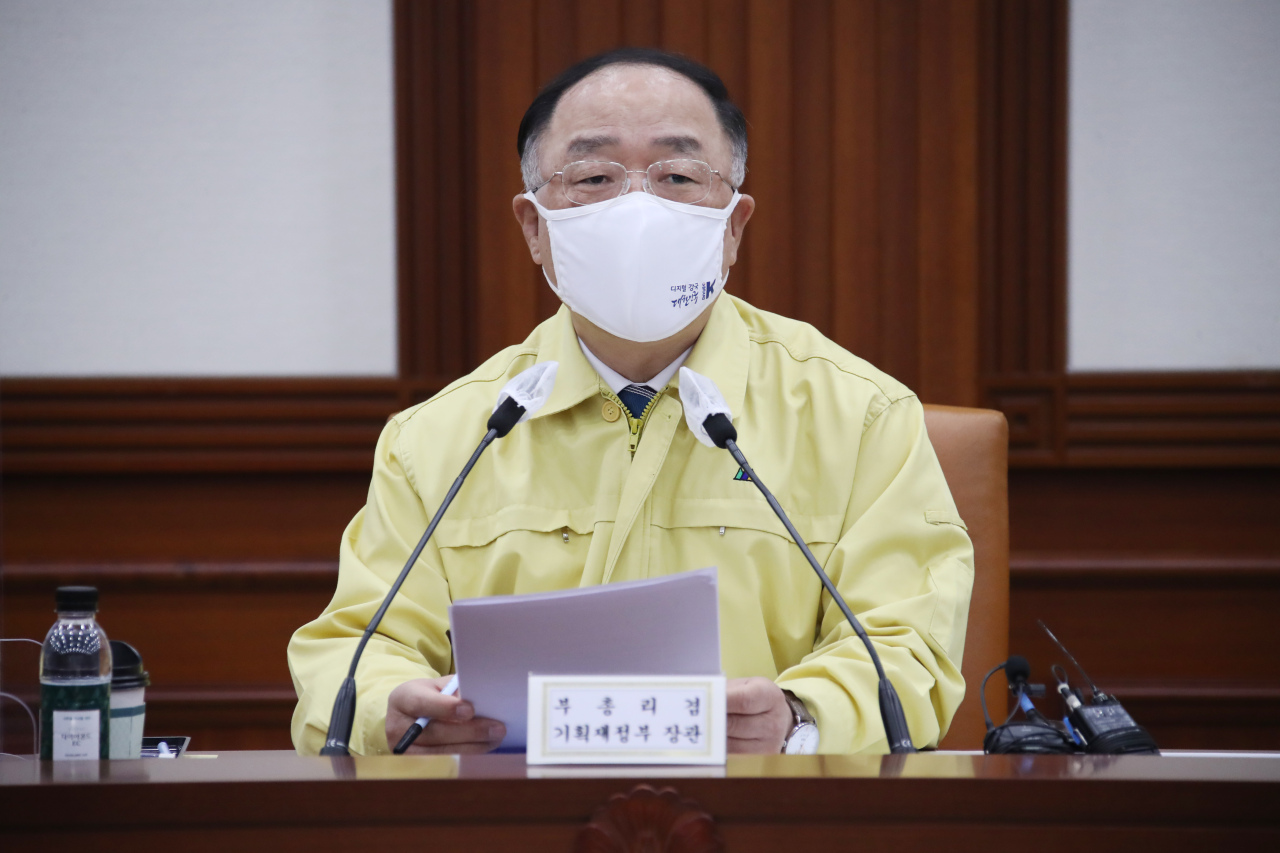
South Korea’s Finance Minister said Wednesday that the state tax benefit program for “good landlords” – those who voluntarily reduce rent to ease burden on tenants – would be extended by another six months to support businesses hit by the COVID-19 pandemic.
The voluntary program – launched in April last year – has been rewarding landlords with a tax credit of 50 percent-to-reduction of rent. The program’s deadline has been already extended once from December 2020 to June this year.
“Regarding rent payment, which has been the heaviest burden for small business owners and the self-employed, we were initially considering to expand the tax credit to 70 percent-to-rent reduction, but in the end, decided to extend the deadline of the program itself to December this year,” Deputy Prime Minister and Finance Minister Hong Nam-ki said at an economic meeting.
Despite government efforts to attract more landlords to the program, critics have expressed skepticism about its effective due to its “voluntary nature.”
According to a data compiled by the National Assembly’s Strategy and Finance Committee last week, the number of landlords that cut back rents for local businesses increased by a disappointing one person on-month to 5,969. The number of stores operated by businesses that received such benefits increased by two to 43,375 in the same period.
In further efforts to help local businesses get back on track, the government plans to submit the first extra budget bill of 2021 to the National Assembly early next month.
“The extra budget would be focused on financial support for damages inflicted by COVID-19 and measures tied to employment and vaccines,” Hong explained.
This marks the fifth extra budget drawn by the Moon Jae-in administration since the outbreak of COVID-19 here early last year. It drew up four supplementary budgets worth a combined 67 trillion won ($47 billion) last year to cope with the fallout from the virus.
For social insurance programs, the government decided to allow a delay of payments for the National Pension Service, the Employment Insurance System, Korea Workers’ Compensation Insurance, according to Hong. Different grace periods would be adopted for each programs, he added.
By Jung Min-kyung (mkjung@heraldcorp.com)
The voluntary program – launched in April last year – has been rewarding landlords with a tax credit of 50 percent-to-reduction of rent. The program’s deadline has been already extended once from December 2020 to June this year.
“Regarding rent payment, which has been the heaviest burden for small business owners and the self-employed, we were initially considering to expand the tax credit to 70 percent-to-rent reduction, but in the end, decided to extend the deadline of the program itself to December this year,” Deputy Prime Minister and Finance Minister Hong Nam-ki said at an economic meeting.
Despite government efforts to attract more landlords to the program, critics have expressed skepticism about its effective due to its “voluntary nature.”
According to a data compiled by the National Assembly’s Strategy and Finance Committee last week, the number of landlords that cut back rents for local businesses increased by a disappointing one person on-month to 5,969. The number of stores operated by businesses that received such benefits increased by two to 43,375 in the same period.
In further efforts to help local businesses get back on track, the government plans to submit the first extra budget bill of 2021 to the National Assembly early next month.
“The extra budget would be focused on financial support for damages inflicted by COVID-19 and measures tied to employment and vaccines,” Hong explained.
This marks the fifth extra budget drawn by the Moon Jae-in administration since the outbreak of COVID-19 here early last year. It drew up four supplementary budgets worth a combined 67 trillion won ($47 billion) last year to cope with the fallout from the virus.
For social insurance programs, the government decided to allow a delay of payments for the National Pension Service, the Employment Insurance System, Korea Workers’ Compensation Insurance, according to Hong. Different grace periods would be adopted for each programs, he added.
By Jung Min-kyung (mkjung@heraldcorp.com)







![[KH Explains] How should Korea adjust its trade defenses against Chinese EVs?](http://res.heraldm.com/phpwas/restmb_idxmake.php?idx=644&simg=/content/image/2024/04/15/20240415050562_0.jpg&u=20240415144419)











![[Today’s K-pop] Stray Kids to return soon: report](http://res.heraldm.com/phpwas/restmb_idxmake.php?idx=642&simg=/content/image/2024/04/16/20240416050713_0.jpg&u=)